助动词用法归纳小学(终审稿)
- 格式:docx
- 大小:569.49 KB
- 文档页数:16
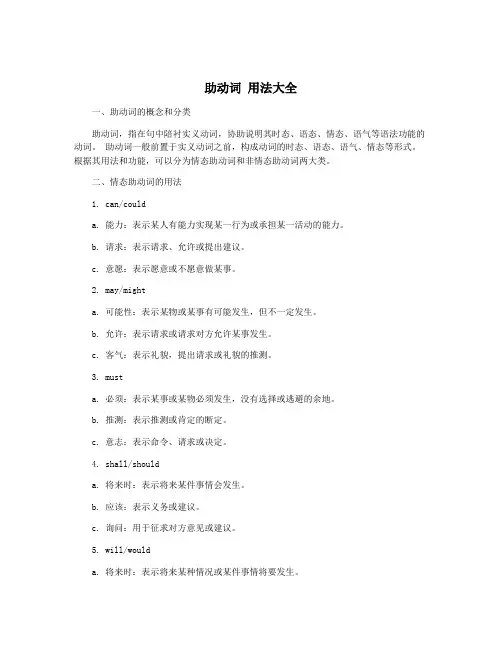
助动词用法大全一、助动词的概念和分类助动词,指在句中陪衬实义动词,协助说明其时态、语态、情态、语气等语法功能的动词。
助动词一般前置于实义动词之前,构成动词的时态、语态、语气、情态等形式。
根据其用法和功能,可以分为情态助动词和非情态助动词两大类。
二、情态助动词的用法1. can/coulda. 能力:表示某人有能力实现某一行为或承担某一活动的能力。
b. 请求:表示请求、允许或提出建议。
c. 意愿:表示愿意或不愿意做某事。
2. may/mighta. 可能性:表示某物或某事有可能发生,但不一定发生。
b. 允许:表示请求或请求对方允许某事发生。
c. 客气:表示礼貌,提出请求或礼貌的推测。
3. musta. 必须:表示某事或某物必须发生,没有选择或逃避的余地。
b. 推测:表示推测或肯定的断定。
c. 意志:表示命令、请求或决定。
4. shall/shoulda. 将来时:表示将来某件事情会发生。
b. 应该:表示义务或建议。
c. 询问:用于征求对方意见或建议。
5. will/woulda. 将来时:表示将来某种情况或某件事情将要发生。
b. 意愿:表示意愿或心愿。
c. 习惯:表示过去的习惯或经常性的动作。
6. ought toa. 应该:表达义务、责任、责任感等情感。
b. 建议:表示建议或劝告。
c. 期望:常用于表达希望或期待的意愿。
三、非情态助动词的用法1. bea. 系动词:用于连接主语和表语,构成系表结构。
b. 进行时:与现在分词搭配表示主语正在进行某项活动。
c. 被动语态:与过去分词搭配表示主语受到动作的影响。
2. doa. 做动词:用于构成一般疑问句、否定式和强调句。
b. 强调:用于强调句中的动词。
3. havea. 拥有:表达主语拥有某种事物或特点。
b. 完成时:与过去分词搭配表示过去动作的完成。
4. willa. 未来时:用于表示将来发生的动作或事件。
b. 意愿:表示主语的意愿或态度。
5. cana. 能力:表示主语有能力完成某项动作。
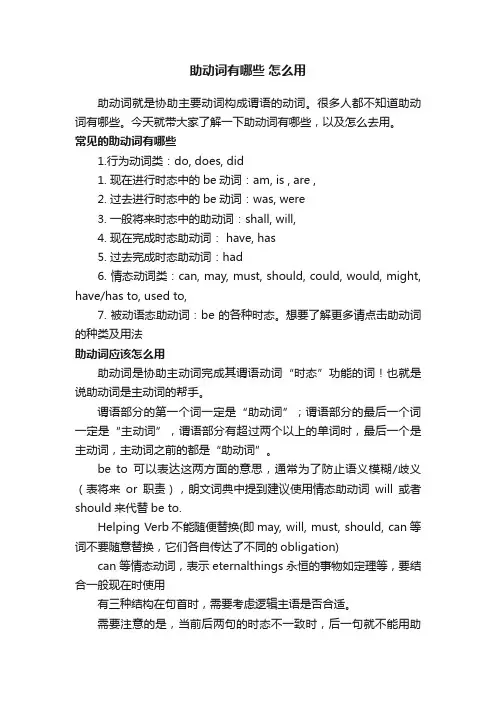
助动词有哪些怎么用助动词就是协助主要动词构成谓语的动词。
很多人都不知道助动词有哪些。
今天就带大家了解一下助动词有哪些,以及怎么去用。
常见的助动词有哪些1.行为动词类:do, does, did1. 现在进行时态中的be动词:am, is , are ,2. 过去进行时态中的be动词:was, were3. 一般将来时态中的助动词:shall, will,4. 现在完成时态助动词: have, has5. 过去完成时态助动词:had6. 情态动词类:can, may, must, should, could, would, might, have/has to, used to,7. 被动语态助动词:be 的各种时态。
想要了解更多请点击助动词的种类及用法助动词应该怎么用助动词是协助主动词完成其谓语动词“时态”功能的词!也就是说助动词是主动词的帮手。
谓语部分的第一个词一定是“助动词”;谓语部分的最后一个词一定是“主动词”,谓语部分有超过两个以上的单词时,最后一个是主动词,主动词之前的都是“助动词”。
be to可以表达这两方面的意思,通常为了防止语义模糊/歧义(表将来or职责),朗文词典中提到建议使用情态助动词will或者should来代替be to.Helping Verb不能随便替换(即may, will, must, should, can等词不要随意替换,它们各自传达了不同的obligation)can等情态动词,表示eternalthings永恒的事物如定理等,要结合一般现在时使用有三种结构在句首时,需要考虑逻辑主语是否合适。
需要注意的是,当前后两句的时态不一致时,后一句就不能用助动词指代。
还有当前后两句的时态不需要一致时,后一句的助动词需要跟随句意,而非生硬照搬前一句的助动词。
还有助动词用的都是肯定语气,即使全句的句义是否定的。
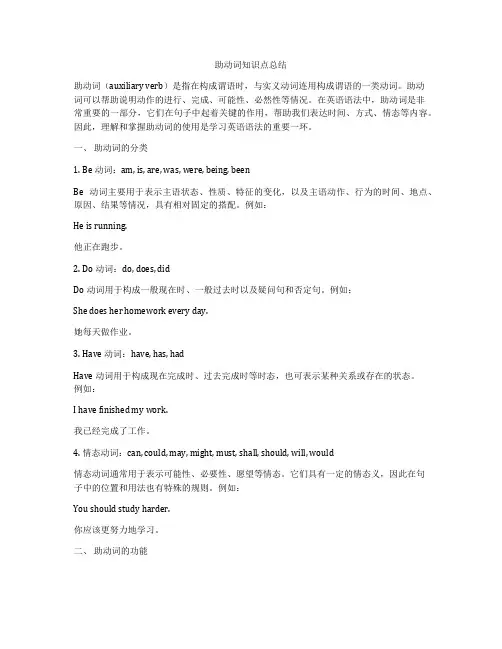
助动词知识点总结助动词(auxiliary verb)是指在构成谓语时,与实义动词连用构成谓语的一类动词。
助动词可以帮助说明动作的进行、完成、可能性、必然性等情况。
在英语语法中,助动词是非常重要的一部分,它们在句子中起着关键的作用,帮助我们表达时间、方式、情态等内容。
因此,理解和掌握助动词的使用是学习英语语法的重要一环。
一、助动词的分类1. Be 动词:am, is, are, was, were, being, beenBe 动词主要用于表示主语状态、性质、特征的变化,以及主语动作、行为的时间、地点、原因、结果等情况,具有相对固定的搭配。
例如:He is running.他正在跑步。
2. Do 动词:do, does, didDo 动词用于构成一般现在时、一般过去时以及疑问句和否定句。
例如:She does her homework every day.她每天做作业。
3. Have 动词:have, has, hadHave 动词用于构成现在完成时、过去完成时等时态,也可表示某种关系或存在的状态。
例如:I have finished my work.我已经完成了工作。
4. 情态动词:can, could, may, might, must, shall, should, will, would情态动词通常用于表示可能性、必要性、愿望等情态。
它们具有一定的情态义,因此在句子中的位置和用法也有特殊的规则。
例如:You should study harder.你应该更努力地学习。
二、助动词的功能1. 构成时态:助动词与实义动词的搭配可以构成各种时态,包括一般现在时、一般过去时、现在进行时、过去进行时、现在完成时、过去完成时等。
助动词的不同搭配可以帮助我们表达不同的时间情况。
2. 构成疑问句和否定句:除了帮助构成时态外,助动词还可以帮助构成疑问句和否定句。
在构成疑问句时,助动词通常位于句首,并与实义动词调换位置;在构成否定句时,助动词通常与 not 搭配构成否定形式。
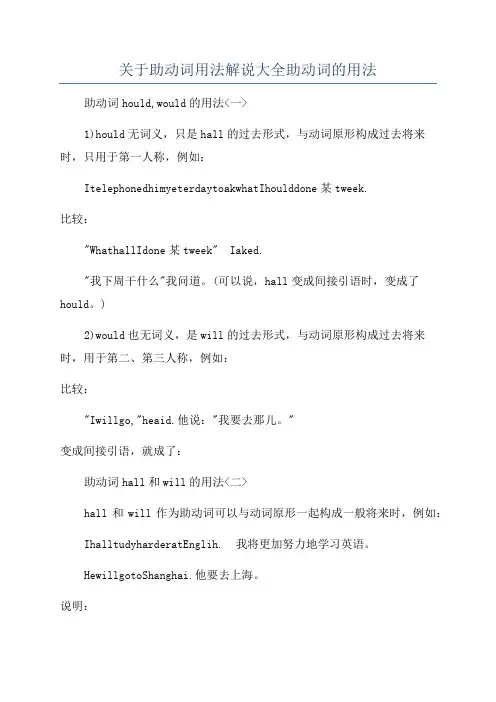
关于助动词用法解说大全助动词的用法助动词hould,would的用法<一>1)hould无词义,只是hall的过去形式,与动词原形构成过去将来时,只用于第一人称,例如:ItelephonedhimyeterdaytoakwhatIhoulddone某tweek.比较:"WhathallIdone某tweek" Iaked."我下周干什么"我问道。
(可以说,hall变成间接引语时,变成了hould。
)2)would也无词义,是will的过去形式,与动词原形构成过去将来时,用于第二、第三人称,例如:比较:"Iwillgo,"heaid.他说:"我要去那儿。
"变成间接引语,就成了:助动词hall和will的用法<二>hall和will作为助动词可以与动词原形一起构成一般将来时,例如:IhalltudyharderatEnglih. 我将更加努力地学习英语。
HewillgotoShanghai.他要去上海。
说明:在过去的语法中,语法学家说hall用于第一人称,will只用于第二、第三人称。
现在,尤其是在口语中,will常用于第一人称,但hall只用于第一人称,如用于第二、第三人称,就失去助动词的意义,已变为情态动词,试比较:助动词do的用法<三>1)构成一般疑问句,例如:DoyouwanttopatheCET 你想通过大学英语测试吗DidyoutudyGerman 你们学过德语吗2)do+not构成否定句,例如:Idonotwanttobecriticized. 我不想挨批评。
Hedoen'tliketotudy. 他不想学习。
Inthepat,manytudentdidnotknowtheimportanceofEnglih. 过去,好多学生不知道英语的重要性。
3) 构成否定祈使句,例如:Don'tgothere. 不要去那里。
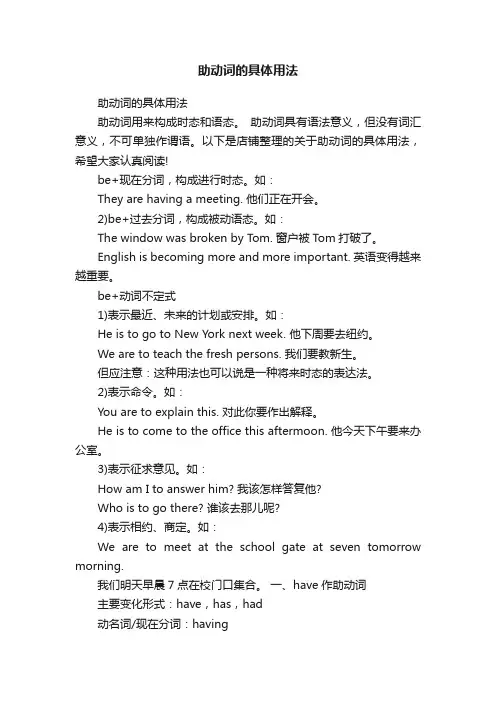
助动词的具体用法助动词的具体用法助动词用来构成时态和语态。
助动词具有语法意义,但没有词汇意义,不可单独作谓语。
以下是店铺整理的关于助动词的具体用法,希望大家认真阅读!be+现在分词,构成进行时态。
如:They are having a meeting. 他们正在开会。
2)be+过去分词,构成被动语态。
如:The window was broken by T om. 窗户被Tom打破了。
English is becoming more and more important. 英语变得越来越重要。
be+动词不定式1)表示最近、未来的计划或安排。
如:He is to go to New York next week. 他下周要去纽约。
We are to teach the fresh persons. 我们要教新生。
但应注意:这种用法也可以说是一种将来时态的表达法。
2)表示命令。
如:You are to explain this. 对此你要作出解释。
He is to come to the office this aftermoon. 他今天下午要来办公室。
3)表示征求意见。
如:How am I to answer him? 我该怎样答复他?Who is to go there? 谁该去那儿呢?4)表示相约、商定。
如:We are to meet at the school gate at seven tomorrow morning.我们明天早晨7点在校门口集合。
一、have作助动词主要变化形式:have,has,had动名词/现在分词:having1)have +过去分词,构成完成时态,例:He has left for London. 他已去了伦敦。
By the end of last month, they had finished half of their work.上月末为止,他们已经完成工作的一半。
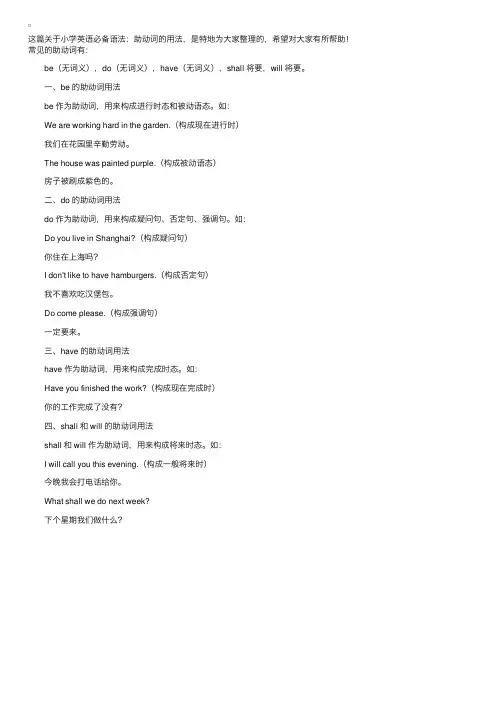
这篇关于⼩学英语必备语法:助动词的⽤法,是特地为⼤家整理的,希望对⼤家有所帮助!常见的助动词有:
be(⽆词义),do(⽆词义),have(⽆词义),shall 将要,will 将要。
⼀、be 的助动词⽤法
be 作为助动词,⽤来构成进⾏时态和被动语态。
如:
We are working hard in the garden.(构成现在进⾏时)
我们在花园⾥⾟勤劳动。
The house was painted purple.(构成被动语态)
房⼦被刷成紫⾊的。
⼆、do 的助动词⽤法
do 作为助动词,⽤来构成疑问句、否定句、强调句。
如:
Do you live in Shanghai?(构成疑问句)
你住在上海吗?
I don't like to have hamburgers.(构成否定句)
我不喜欢吃汉堡包。
Do come please.(构成强调句)
⼀定要来。
三、have 的助动词⽤法
have 作为助动词,⽤来构成完成时态。
如:
Have you finished the work?(构成现在完成时)
你的⼯作完成了没有?
四、shall 和 will 的助动词⽤法
shall 和 will 作为助动词,⽤来构成将来时态。
如:
I will call you this evening.(构成⼀般将来时)
今晚我会打电话给你。
What shall we do next week?
下个星期我们做什么?。
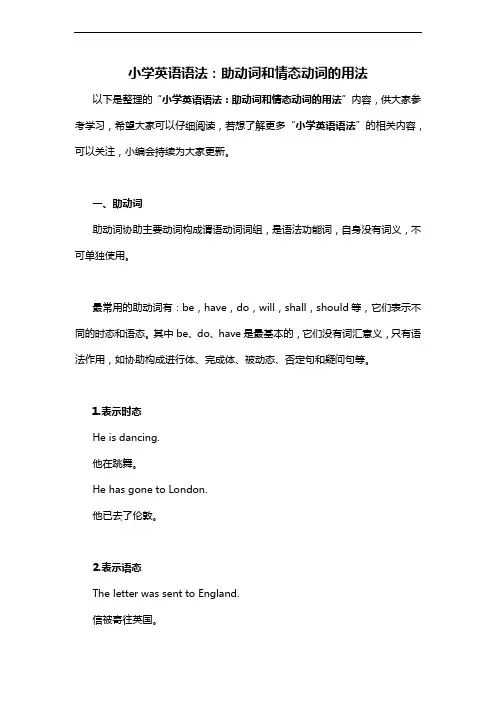
小学英语语法:助动词和情态动词的用法以下是整理的“小学英语语法:助动词和情态动词的用法”内容,供大家参考学习,希望大家可以仔细阅读,若想了解更多“小学英语语法”的相关内容,可以关注,小编会持续为大家更新。
一、助动词助动词协助主要动词构成谓语动词词组,是语法功能词,自身没有词义,不可单独使用。
最常用的助动词有:be,have,do,will,shall,should等,它们表示不同的时态和语态。
其中be、do、have是最基本的,它们没有词汇意义,只有语法作用,如协助构成进行体、完成体、被动态、否定句和疑问句等。
1.表示时态He is dancing.他在跳舞。
He has gone to London.他已去了伦敦。
2.表示语态The letter was sent to England.信被寄往英国。
The dog is lost.小狗被弄丢了。
3.用作构成疑问句Do you like coffee?你喜欢咖啡吗?Did you father have dinner with you?你父亲和你一起吃晚饭了吗?4.与否定副词not合用,构成否定句I don't ike him.我不喜欢他。
He didn't catch the bus.他没有赶上车。
5.加强语气In fact,I do weep a little.实际上,我的确哭了一会儿。
I do love you.我确实很爱你。
6. shall和will的助动词用法1)shall 和will 作为助动词可以与动词原形一起构成一般将来时I shall write a letter to my grandmother.我将给我的祖母写一封信。
He will go to Sydney.他要去悉尼。
2)shall 在疑问句中,用于第一人称比较多,用来征求对方意愿Shall I turm on the light?我可以把灯打开吗?Shall we go shopping?我们去购物好吗?三、情态动词情态动词本身有一定的词义,表示说话人对有关行为或事物的态度和看法,认为其可能、应该或必要等。
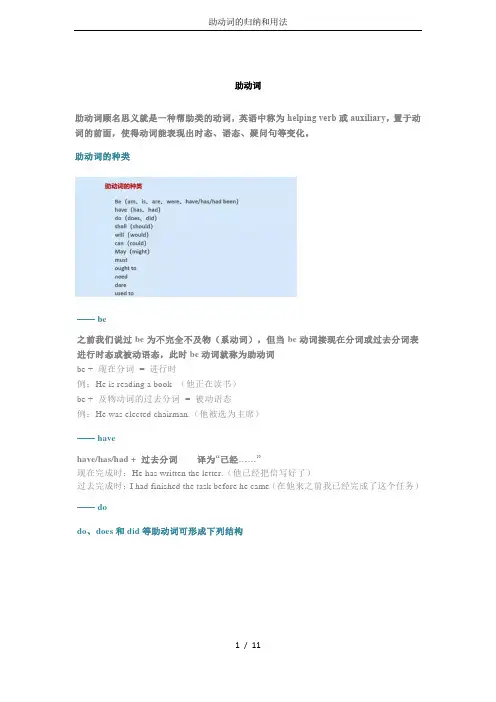
助动词助动词顾名思义就是一种帮助类的动词,英语中称为helping verb或auxiliary,置于动词的前面,使得动词能表现出时态、语态、疑问句等变化。
助动词的种类—— be之前我们说过be为不完全不及物(系动词),但当be动词接现在分词或过去分词表进行时态或被动语态,此时be动词就称为助动词be + 现在分词= 进行时例:He is reading a book (他正在读书)be + 及物动词的过去分词= 被动语态例:He was elected chairman.(他被选为主席)—— havehave/has/had + 过去分词译为“已经……”现在完成时:He has written the letter.(他已经把信写好了)过去完成时:I had finished the task before he came(在他来之前我已经完成了这个任务)—— dodo、does和did等助动词可形成下列结构注意:①任何动词要用not连用形成否定,一定要靠do、does、did再加上not协助,千万千万不可形成这样的句子:I not love her(错).而应该改为I don't love her.②动词前若置not以外的否定词,如:never(从来不)、seldom(不常)、rarely(很少)、hardly(几乎不)、scarcely(几乎不)等,则不需要与do/does/did连用。
例1:He never lived here.(他从未住过这儿)例2:He seldom sings.(他很少唱歌)do、does和did可形成疑问句例1:Did you understand it?(你懂吗?)例2:Where does he live?(他住在哪儿?)do、does和did加强语气即在肯定句的动词前,按时态人称置入do/does/did,再将动词改为原形,此时do/does/did译成“的确”He loves her.(他爱她)→He does love her(他确实爱她)He worked hard.(他很用功)→ He did work hard.(他确实很用功)do、does和did也可作代动词,用来代替已出现过的动词及其后的其他动词Did you read this book?(你读过这本书吗)Yes ,I did.(是的,我读过)—— shall和willshall和will表“将要”时,之后接原型动词现在的英语中,表单纯的一般将来时,不论主语为第几人称,都使用will,很少用shall。
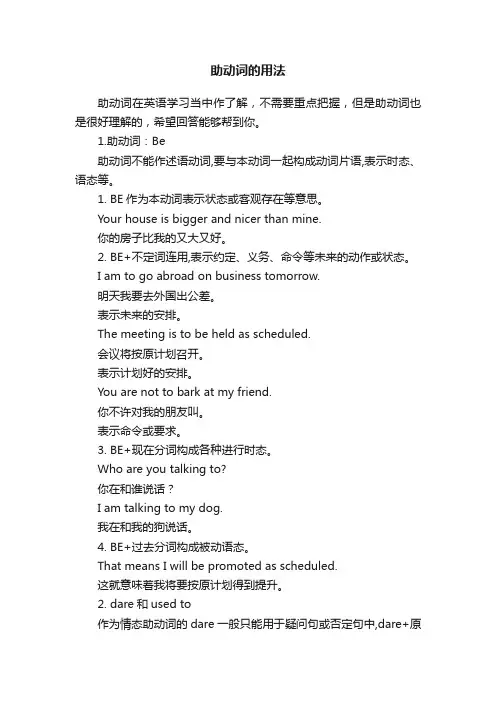
助动词的用法助动词在英语学习当中作了解,不需要重点把握,但是助动词也是很好理解的,希望回答能够帮到你。
1.助动词:Be助动词不能作述语动词,要与本动词一起构成动词片语,表示时态、语态等。
1. BE作为本动词表示状态或客观存在等意思。
Your house is bigger and nicer than mine.你的房子比我的又大又好。
2. BE+不定词连用,表示约定、义务、命令等未来的动作或状态。
I am to go abroad on business tomorrow.明天我要去外国出公差。
表示未来的安排。
The meeting is to be held as scheduled.会议将按原计划召开。
表示计划好的安排。
You are not to bark at my friend.你不许对我的朋友叫。
表示命令或要求。
3. BE+现在分词构成各种进行时态。
Who are you talking to?你在和谁说话?I am talking to my dog.我在和我的狗说话。
4. BE+过去分词构成被动语态。
That means I will be promoted as scheduled.这就意味着我将要按原计划得到提升。
2. dare和used to作为情态助动词的dare一般只能用于疑问句或否定句中,dare+原形动词表示敢。
I dare not say it is ugly.我不敢说它丑。
How dare you say so?你怎么敢这么说?dare也可以作本动词,用于肯定句,后面要接带to的不定词;主词若是第三人称单数,简单现在式时,dare要变为dares。
You, you dare to talk to me like this!你、你竟敢这样和我讲话!used to+原形动词表示过去的习惯或状态,而现在已经不存在了。
You're not what you used to be.你不是以前的你了。

助动词助动词顾名思义就是一种帮助类的动词,英语中称为helping verb或auxiliary,置于动词的前面,使得动词能表现出时态、语态、疑问句等变化。
助动词的种类—— be之前我们说过be为不完全不及物(系动词),但当be动词接现在分词或过去分词表进行时态或被动语态,此时be动词就称为助动词be + 现在分词= 进行时例:He is reading a book (他正在读书)be + 及物动词的过去分词= 被动语态例:He was elected chairman.(他被选为主席)—— havehave/has/had + 过去分词译为“已经……”现在完成时:He has written the letter.(他已经把信写好了)过去完成时:I had finished the task before he came(在他来之前我已经完成了这个任务)—— dodo、does和did等助动词可形成下列结构注意:①任何动词要用not连用形成否定,一定要靠do、does、did再加上not协助,千万千万不可形成这样的句子:I not love her(错).而应该改为I don't love her.②动词前若置not以外的否定词,如:never(从来不)、seldom(不常)、rarely(很少)、hardly(几乎不)、scarcely(几乎不)等,则不需要与do/does/did连用。
例1:He never lived here.(他从未住过这儿)例2:He seldom sings.(他很少唱歌)do、does和did可形成疑问句例1:Did you understand it?(你懂吗?)例2:Where does he live?(他住在哪儿?)do、does和did加强语气即在肯定句的动词前,按时态人称置入do/does/did,再将动词改为原形,此时do/does/did译成“的确”He loves her.(他爱她)→He does love her(他确实爱她)He worked hard.(他很用功)→ He did work hard.(他确实很用功)do、does和did也可作代动词,用来代替已出现过的动词及其后的其他动词Did you read this book?(你读过这本书吗)Yes ,I did.(是的,我读过)—— shall和willshall和will表“将要”时,之后接原型动词现在的英语中,表单纯的一般将来时,不论主语为第几人称,都使用will,很少用shall。

归纳助动词的用法好嘞,以下是为您归纳的助动词用法:助动词啊,就像是我们语言学习中的小助手,虽然它们不像实词那么显眼,但作用可大着呢!咱们先来说说常见的助动词“can”。
“can”表示“能,能够”,比如“我能跑得很快”,就是“I can run very fast” 我记得有一次在学校运动会上,有个小个子同学报名参加了跑步比赛。
大家一开始都不太看好他,觉得他个子小,可能跑不快。
结果比赛一开始,他就像一阵风似的冲了出去,那速度,简直让人惊叹!后来我们问他怎么跑这么快,他自信满满地说:“I can run fast because I practice every day” 你瞧,“can”就这么自然地用出来啦。
“could”也是个常见的助动词,它是“can”的过去式。
比如说“我小时候能跳很高”,那就是“I could jump very high when I was a child” 我想起小时候和小伙伴们一起玩耍,有一个高高的土墙,大家都想试着跳上去看看墙那边的世界。
我一开始不敢,后来在小伙伴的鼓励下,鼓起勇气跳了一下,还真就上去了。
那时候就觉得自己可厉害了,到处跟人说:“I could jump onto that high wall”“may”呢,意思是“可能,也许”。
“明天可能会下雨”就是“It may rain tomorrow” 有一回我们全家准备出去野餐,东西都准备好了,结果早上起来看天空阴沉沉的,妈妈说:“It may rain today Maybe we should change our plan” 当时心里那个失落呀,就盼着别下雨。
“might”是“may”的过去式。
像“他昨天可能没来上学”,就是“He might not come to school yesterda y” 记得有一次老师点名,有个同学没来,大家都在猜测他为啥没来,有的说生病了,有的说睡过头了,最后老师说:“He might have something important to do”“must”表示“必须”。
助动词的基本功用1)协助主要动词构成谓语动词词组的词叫助动词(Auxiliary Verb),被协助的动词称作主要动词(Main Verb)。
助动词自身没有词义,不可单独使用,例如:He doesn‟t like English.他不喜欢英语。
(doesn‟t是助动词,无词义;like是主要动词,有词义)2)助动词协助主要动词完成以下功用,可以用来:a. 表示时态,例如:He is singing.他在唱歌。
He has got married.他已结婚。
b. 表示语态,例如:He was sent to England.他被派往英国。
c. 构成疑问句,例如:Do you like college life?你喜欢大学生活吗?Did you study English before you came here?你来这儿之前学过英语吗?d. 与否定副词not合用,构成否定句,例如:I don‟t like him.我不喜欢他。
e. 加强语气,例如:Do come to the party tomorrow evening. 明天晚上一定来参加晚会。
He did know that.他的确知道那件事。
3)最常用的助动词有:be,have,do,shall,will,should,would助动词be的用法1)be +现在分词,构成进行时态,例如:They are having a meeting.他们正在开会。
English is becoming more and more important. 英语现在越来越重要。
2)be + 过去分词,构成被动语态,例如:The window was broken by Tom……窗户是汤姆打碎的。
English is taught throughout the world.世界各地都教英语。
3)be + 动词不定式,可表示下列内容:a. 表示最近、未来的计划或安排,例如:He is to go to New York next week……他下周要去纽约。
助动词be、do、have的助动词用法关于英语的助动词,大家知道的有哪些吗?接下来,小编给大家准备了助动词be、do、have的助动词用法,欢迎大家参考与借鉴。
助动词be、do、have的助动词用法be的助动词用法be作助动词用的形式如下:①am, is, are, was, were②助动词+be:shall be, will be, can be, etc.③have/has/had + been(完成时)④am, is, …being(进行时)(1)表达进行时态句型 be + V-ing…(进行时态)例:What are you reading?(你正在阅读什么?)I am reading a magazine.(我正在阅读杂志。
)例:He will be taking a walk in the park at this time tomorrow morning.(明天早晨此时他将会正在公园散步。
)例:She has been teaching1 English in our school for years.(她已在我们学校教英语许多年了。
)解说:第一例句是表达现在进行时,第二例句是将来进行时,第三例句是现在完成进行时。
(2)表达被动语态句型be +p.p. …(被动语态)例:English is spoken in both Canada and the United States.(加拿大和美国都讲英语。
)例:Those keys were found in your drawer.(那些钥匙是在你的抽屉里找到的。
)例:It can be done much faster in this way.(这件工作用这个方法可以更加快速地做好。
)have的助动词用法(1)表达完成时态句型have (has, had1) +p.p. …句型can (could2), …have + p.p.例:He can’t have said3 such4 a foolish5 word.(他不像是会说了这样傻的话。
英语常见助动词的用法英语常见助动词的用法协助主要动词构成谓语的词叫助动词,也叫辅助动词。
被协助的动词称作主要动词。
助动词用来构成时态和语态。
下面是小编帮大家整理的英语常见助动词的.用法,欢迎大家分享。
英语常见助动词的用法常见助动词:be(无词义),do/does/did(无词义),have(无词义),shall 将要,will 将要。
分类半助动词在功能上介于主动词和助动词之间的一类结构,称为半助动词。
常见的半助动词有:be to, be about to, be due to, be going to, be likely to,be meant to,be obliged to, be supposed to, be willing to, have to,seem to,be unable to, be unwilling to. 等。
情态助动词1.情态助动词包括will(would),shall(should),can(could),may(might), must, need to, dare to, ought to, used to,had better,有词汇意义,后接动词原形(没有to的不定式)。
2.情态助动词没有主语是第三人称单数时,词尾不加s。
如:She will come here.(√)She wills come here.(×) will后不加S情态助动词不受主语的人称和数的限制。
3.两个情态助动词不能连用。
基本助动词基本助动词只有三个:be, do, have,它们没有词汇意义,只有语法作用,如协助构成进行体,完成体,被动态,否定句,疑问句等。
例如:He is giving a lecture. 他在作报告。
He has made a plan. 他已经订了计划。
The small animals are kept in the cages. 小动物都关在笼子里。
助动词的用法口诀[5篇材料]第一篇:助动词的用法口诀助动词的用法口诀助动词,用法怪;只当佐料不当菜。
句型变换显身手;常与时态谈恋爱。
have完成be进行;will将来三大块。
加上各自过去式;总共构成六时态。
否定疑问靠它们;用法如同be相待。
一般现在和过去;没有助动也无碍。
否定疑问照常变;过去did,do现在。
第三人单用does;遵守be法和情态。
特殊疑问句疑问词的选用口诀如下:特殊疑问有多变;人作主语who来问。
How long用来问多久;多久一次how often。
问到钟点what time;什么时候when走前。
What does问职业;哪个which在前面。
价格多少how much;how many可数永不变。
要问地点用where;怎么让how上前线。
年龄总是how old;what colour涂颜面。
实义动词的用法口诀常接动名词的动词口诀如下:我们这样来读:动词后接ing;动词后接ing;miss错过imagine想象和practise练习。
错过想象和练习。
consider考虑enjoy享受就delay推迟;考虑享受就推迟;admit承认risk冒险去suggest建议。
承认冒险去建议。
你来appreciate欣赏我mind介意;你来欣赏我介意;finish完成save救助再keep保持。
完成救助再保持。
avoid避免forgive宽恕要deny拒绝;避免宽恕要拒绝;insist坚持resist抵抗不give up放弃。
坚持抵抗不放弃。
常接不定式的动词口诀如下:动词接“to”go去manage安排;动词接to去安排;decide决定offer提供不expect期待。
决定提供不期待。
refuse 拒绝ask要求和help帮助;拒绝要求和帮助;hope希望plan计划会fail失败。
希望计划会失败。
你want要promise承诺determine决心在;你要承诺决心在;pretend假装agree同意prepare准备来。
助动词用法归纳小学(终审稿)助动词用法归纳小学公司内部档案编码:[OPPTR-OPPT28-OPPTL98-OPPNN08]助动词(Auxiliary Verb):协助主要动词构成谓语动词词组的词。
自身没有词义,不可单独使用。
主要动词(Main Verb):是被协助的动词,构成时态和语态。
He doesn't like English. 他不喜欢英语。
(doesn't是助动词,无词义;like是主要动词,有词义)最常用的助动词有:be, have, do, shall, will, should, would 等。
基本助动词只有三个:be, do, have他们没有词汇意义,只有语法作用,如协助构成进行时,完成时,被动态,否定句,疑问句等。
一、be 动词的用法既可作系动词,又可作助动词,做助动词有人称和数的变化,第一人称用am,第二人称及复数用are,第三人称及单数用is, am,is 过去式为was, are的过去式为were,它与现在分词构成进行时态和过去分词一起构成被动语态。
a. 表示时态 be+doing(现在分词)表示现在进行的动作He is singing. 他正在唱歌。
b. 表示语态 be+done(过去分词)表被动语态He was sent to England. 他被派往英国。
c. be+to do(动词不定式)表示计划安排命令。
We are to plant trees next week. 下周我们将要去植树。
You are to explain this 。
对此你要做出解释。
二、do的用法Do主要帮助实意动词构成否定和疑问句,后跟动词原形,有时放在实意动词前起强调作用,还可代替前文出现的动词,避免重复。
Do 有人称和数的变化,第一、二人称及复数用do,第三人称及单数用does,过去式为did。
1)构成一般疑问句。
DO +主语+动词原形 +其他I like singing 变为疑问句为 Do you like singing2)do + not 构成否定句。
助动词用法归纳小学公司内部档案编码:[OPPTR-OPPT28-OPPTL98-OPPNN08]助动词(Auxiliary Verb):协助主要动词构成谓语动词词组的词。
自身没有词义,不可单独使用。
主要动词(Main Verb):是被协助的动词,构成时态和语态。
He doesn't like English. 他不喜欢英语。
(doesn't是助动词,无词义;like是主要动词,有词义)最常用的助动词有:be, have, do, shall, will, should, would 等。
基本助动词只有三个:be, do, have他们没有词汇意义,只有语法作用,如协助构成进行时,完成时,被动态,否定句,疑问句等。
一、be 动词的用法既可作系动词,又可作助动词,做助动词有人称和数的变化,第一人称用am,第二人称及复数用are,第三人称及单数用is, am,is 过去式为was, are的过去式为were,它与现在分词构成进行时态和过去分词一起构成被动语态。
a. 表示时态 be+doing(现在分词)表示现在进行的动作He is singing. 他正在唱歌。
b. 表示语态 be+done(过去分词)表被动语态He was sent to England. 他被派往英国。
c. be+to do(动词不定式)表示计划安排命令。
We are to plant trees next week. 下周我们将要去植树。
You are to explain this 。
对此你要做出解释。
二、do的用法Do主要帮助实意动词构成否定和疑问句,后跟动词原形,有时放在实意动词前起强调作用,还可代替前文出现的动词,避免重复。
Do有人称和数的变化,第一、二人称及复数用do,第三人称及单数用does,过去式为did。
1)构成一般疑问句。
DO +主语+动词原形 +其他I like singing 变为疑问句为 Do you like singing2)do + not 构成否定句。
主语+do +not +动词原形。
I do not want to be criticized. 我不想挨批评。
He doesn't like to study. 他不想学习。
Many students didn’t know the importance of English before. 过去好多学生不知道英语的重要性.3) 构成否定祈使句。
Don't go there. 不要去那里。
Don't be so absent-minded. 不要这么心不在焉。
说明:构成否定祈使句只用do,不用did和does。
4)放在动词原形前,加强该动词的语气。
Do come to my birthday party please. 请一定来参加我的生日宴会。
I did go there. 我确实去那儿了。
I do miss you. 我确实想你。
我真想你了!5)用作代替动词。
---- Do you like Beijing? --你喜欢北京吗?---- Yes, I do. No,I don’t. --是的,喜欢。
(do用作代动词,代替like Beijing.)He knows how to drive a car, doesn't he? 他知道如何开车,对吧?三、have 的用法Have+过去分词构成完成时态I have studied english for a long time .情态动词的基本用法归纳情态动词有can (could), may (might), must, have to, shall (should, will (would), dare (dared), need (needed), ought to 等。
情态动词无人称和数的变化;不能单独使用,必须与其后的动词原形构成谓语。
一、 can, could1) 表示能力Mary can speak three languages.Can you skate?此时可用be able to代替。
Can只有一般现在时和一般过去式;而be able to则有更多的时态。
I’ll not be able to come this afternoon.当表示“经过努力才得以做成功某事”时应用be able to,不能用Can。
如:He was able to go to the party yesterday evening in spite of the heavy rain.2) 表示请求和允许。
-----Can I go now?----- Yes, you can. / No, you can’t.此时可与may互换。
在疑问句中还可用could,might代替,不是过去式,只是语气更委婉,不能用于肯定句和答语中。
---- Could I come to see you tomorrow?---- Yes, you can. ( No, I’m afraid not. )3) 表示推测(惊讶、怀疑、不相信的态度),用于疑问句、否定句和感叹句中。
Can this be true?This can’t be done by him.How can this be true?二、 may, might1) 表示请求和允许。
might比 may语气更委婉,而不是过去式。
否定回答时可用can’t或mustn’t,表示“不可以,禁止”。
----Might/ May I smoke in this room?---- No, you mustn’t.---- May/Might I take this book out of the room?---- Yes, you can. (No, you can’t / mustn’t. )用May I...征徇对方许可时比较正式和客气,而用Can I...在口语中更常见。
2)用于祈使句,表示祝愿。
May you succeed!3) 表示推测、可能性(不用于疑问句)。
might不是过去式,它所表示的可能性比may小。
1.He may /might be very busy now.2.Your mother may /might not know the truth.三、 must, have to1) 表示必须、必要。
You must come in time.在回答引出的问句时,如果是否定的,不能用mustn’t(禁止,不准),而用needn’t, don’t have to(不必).---- Must we hand in our exercise books today?---- Yes, you must.---- No, you don’t have to / you needn’t.2) must是说话人的主观看法,而have to则强调客观需要。
Must 只有一般现在时, have to 有更多的时态形式。
1.he play isn’t interesting, I really must go now.2. I had to work when I was your age.3) 表示推测、可能性(只用于肯定的陈述句)1.You’re Tom’s good friend, so you must know wha t he likes best.2. Your mother must be waiting for you now.四、 shall, should1)shall +动词原形表示将来时态Shall we go shopping tomorrow?2) shall 用于第一人称,征求对方的意见。
What shall we do this evening?shall 用于第二、三人称,表示说话人给对方的命令、警告、允诺或威胁。
1. You shall fail if you don’t work hard.(警告)2. He shall have the book when I finish it.(允诺)3. He shall be punished.(威胁)六、 will, would1) 表示请求、建议等,would更委婉。
Would you like a cup of coffee 你想要一杯咖啡吗?2)will +动词原形表将来时态He will come back next month . 他下个月将会回来。
3)表示意志、愿望和决心。
1. I will never do that again.助动词练习题1 把下列句子变为一般疑问句。
1.It is a lovely dog.________________________________________2.She is lovely girl.________________________________________3.We are classmates.______________________________________4.I am a doctor.________________________________________5.There is a bird in the tree.________________________________6.They are good friends.____________________________________7.I love my parents._______________________________________9. We have a pleasant home._______________________________10.They go to church on Sunday._____________________________11.You are a singer.______________________________2. 用do does be 填空1> _____ she know all the answersYes , she ____ . No, she _____.2> _____ the twins often fightYes ,_____ do. No, _____ don’t.3> _____ your dad like listening to musicYes ,____ does . No, _____ doesn’t.5> _____ you have a new teacherYes , I ______. No, I ______.6> _____ she a teacherYes, she _____ . No, she _____.10> _____ your father smoking in the living room?Yes, ____ is .No, he _____.助动词和情态动词专项练习一、情态动词的基本用法⒈Can John Smith ______ his homework on time?A. finishB. finishesC. finishingD. finished⒉She dare ______ out by herself at night.A. go notB. not to goC. to not goD. not go⒊You ______ to the party tonight if you have something important to do.A. don’t need comeB. needn’t to comeC. needn’t comeD. don’t need coming⒋—We’ll be ready to leave at eight.—Well, John must ______ back by then.A. beingB. isC. beD. to be⒌Your grandmother ______ the newspaper without glasses.A. can still readB. cans still readC. still can readsD. can still reads二、must, need, dare的用法⒍—Must I get up early tomorrow, Dad?—No, you _____. Tomorrow is Sunday.A. can’tB. mustn’tC. needn’tD. couldn’t⒎—Must we finish the book today?—Yes, you ______.A. canB. mayC. needD. must⒏You ______ play on the road. It’s dangerous.A. mustn’tB. mayC. canD. must⒐You ______ return the book now. You can keep it until next week.A. can’tB. mustn’tC. needn’tD. dare not⒑I ______ a sleeping bag because I’ve already got one.A. needn’t haveB. didn’t haveC. don’t needD. need not⒒Mr Smith ______ a pen from Jack.A. must to borrowB. had borrowedC. must borrowedD. had to borrow三、can, could, may, might的用法⒓The man ____ walk fast because he is lame in the right foot.A. mustB. mustn’tC. canD. can’t⒔—Could I borrow your dictionary?—Yes, of course you ______.A. willB. wouldC. mustD. can⒕A computer _____ think for itself, it must be told what to do.A. might notB. may notC. couldn’tD. can’t⒖—That must be a mistake.—I don’t think so. It ______ a mistake.A. may be notB. needn’t beC. cannot be⒗He ______ help crying at the news of his father’s death.A. couldn’tB. shouldn’tC. hadn’tD. didn’t⒘“Now, ______ all smile, please?” he asked.A. may youB. do youC. shall youD. can you⒙I haven’t brought my dictionary with me. _____ I use yours?A. MustB. ShallC. MayD. Need四、should, would, shall, will的用法⒚—Must I copy the new words in class?—No, you ______. You ______ do it at home.A. needn’t, mayB. mustn’t, mustC. mustn’t, mayD. needn’t, mustn’t⒛—Would you please not draw pictures on the wall?—Sorry. I ______ it again.A. am not doingB. don’t doC. didn’t doD. won’t do21.______ I open the windowIt’s so warm here.A. ShallB. WillC. WouldD. Must22.______ you like some oranges?A. WouldB. CanC. MayD. Must23.Tom said that he ______ apologize to Mary.A. wouldB. willC. shallD. is going to24.“Do you think we ______ turn back?” Jane asked.A. shallB. willC. shouldD. would⒈He ______ any help. He can do it all by himself.A. needs notB. needn’tC. doesn’t needD. doesn’t need to ask⒉Li Fang isn’t in the classroom. He ______ be at the library. Let’s go and find him.A. canB. mustC. needD. should⒊—May I have a look at your new watch—Yes, you ______.A. canB. mustC. needD. should⒋—Must I hand in the exercise book tomorrow—No, you______. You can hand it in the day after tomorrow.A. can’ tB. mustn’tC. needn’tD. couldn’t⒌There ______ an English test next Monday.A. maybeB. wasC. may beD. may⒍You’d better ask someone, or you______ get lost.A. mayB. mustn’tC. are going toD. can7.“Come on!” Peter called. “We ______ stay here any longer.”A. couldn’tB. can’tC. hadn’t toD. mightn’t8..Must Tom write it now No, he ______.A. needn’tB. can’tC. mustD. mustn’t9.“Have you seen Li recently?”“No, I think he must ______ away on vacation.”A. beingB. isC. beD. to be10.“All right. You ______ if you don’t want to.”A. don’t need stayB. needn’t stayC. needn’t to stayD. don’t need staying1:She________toseedocumentaries(记录片).A、do?wantB、 don't?wantC、doesn't?wantD、not?want2:Lookatthatpictureonthewall.__________youlikeitA、DoB、CanC、CouldD、Are3:He________likepears.A、 doB、isC、doesn'tD、not 4:—Doyouoftengotothecinema______Sunday—No,we__________.A、on,don't B、on,aren't C、in,do D、in,don't5:-Canyouseealightonthetable-Yes,________.A、I?amB、I’m?notC、I?canD、He?isn’t 6:—Doestheboywanttobeanactor—________.A、 Yes,heisB、No,hedoesC、Yes,hedoesD、No,heisn't7:_________hehaveanyapplesA、DoB、DoesC、IsD、Are8:She______wanttobeapolicewoman,becauseshethinksit’skindofdanger ous.A、isn’tB、aren’tC、don’tD、doesn’t9:Why____hehavebrownhairA、 doB、doesC、isD、has10:Whattime__________hegethomeeverydayA、isB、doesC、doD、am11:What________youseeinthepictureA、isB、areC、can?D、have12:Jack_______likeflyingkites______throwingafrisby.A、don't,or B、doesn't,and C、 don't,and D、doesn't,or13:A:________Jim________aballB:No,he________.A、Do,have,don'tB、Does,has,doesn'tC、Is,have,isn'tD、Does,have,doesn't14:I________haveawatch.A、 am?notB、doesC、don'tD、doesn't15:____you____agoodtimeonyourvacationA、Did;have B、Did;had C、Were;have D、Were;had16:Simonlikes_____football,buthedoesn’t_____itwell. A、 play,plays B、toplay,plays C、plays,playing D、playing,play17:She____havetowashthedishesnow.A、don'tB、notC、doesn'tD、can't18:—________Colin________Chinesehistory—Yes,hedoes.A、Do;like B、Does;likes C、Do;likes D、Does;like19:LiLei______lunchathome.A、hasn’tB、haven’tC、don’t?haveD、doesn’t?have20:-Whocleanedtheblackboardyesterday,Dick-John___.A、cleanedB、doesC、didD、is21:__________youusuallycometoschoolbybikeA、Don'tB、Doesn'tC、Aren'tD、Isn't22:-Where______lionscomefrom-IthinktheycomefromAfrica.A、are?B、is?C、does?D、do23:__________wehaveanyeggsA、Aren'tB、Don'tC、Can'tD、Mustn't24:____youonyourvacationyesterdayA、AreB、WereC、WasD、Did25:-Who____dinnerlastnight-Mymother____.A、cooked;didB、did;cooked C、did;did D、cooked;cooked1.There __________ a meeting tomorrow afternoon.A. will be going toB. will going to beC. is going to beD. will go to be2. Mother ________ me a nice present on my next birthday.A. will givesB. will giveC. givesD. Give3.Listen! The girl _____________ in the room.A. singsB. singingC. is singingD. are singing4.What are you doing I’m __________ TV.A. watchB. watchesC. to watchD. Watching5.In our school there are fifty-five ___.A women teachers B. woman teachers. C women teacher D. woman’s teacher6.Jack went to have two ___ pulled out yesterday afternoon.A. toothsB. toothC. teethD. Toothes7.Many ____ have been built in our city since 1987.A. factorysB. factoriesC. factoryesD. factorys8.Who's that at the door ____ is the postman.A. SheB. ThisC. ItD. He9. you go to the movies yesterday?A.DoB.DidC..DoesD.Have。